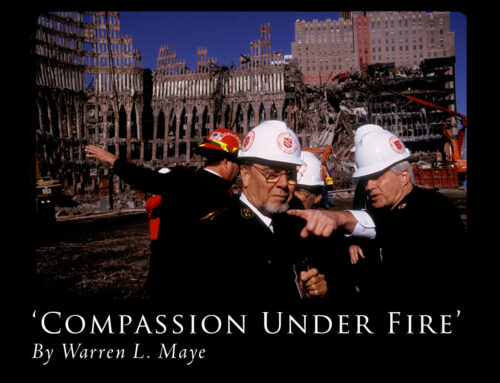
Skeleton Army Rolls Into 2024
by Robert Mitchell
“The LORD took hold of me, and I was carried away by the Spirit of the LORD to a valley filled with bones. He led me all around among the bones that covered the valley floor. They were scattered everywhere across the ground and were completely dried out. Then he asked me, ‘Son of man, can these bones become living people again?’” —Ezekiel 37:1-3, NLT
The musical Skeleton Army, which popularizes the story of an opponent of the early Salvation Army in England who later became an officer, is alive and well with bookings into the new year.
“We thought that we would be kind of wrapping up this year because we’ve been touring since 2019 and doing about one show a month,” says Kathryn Higgins, director of the USA Eastern Territory’s Arts Ministries Bureau. “I thought we’d be losing a little bit of interest, but it’s not dying down at all. We’re still getting lots of bookings. We’ll keep it going as long as people are interested.”
 The musical’s protagonist is Charles Jeffries, who was originally part of the Skeleton Army, a group that showed up at Salvation Army events to cause mischief in the 1800s. The group enjoyed hijinks like throwing flour on people during open airs and releasing chickens into meeting halls as The Salvation Army spread its message of soup, soap, and salvation to the poor and homeless.
The musical’s protagonist is Charles Jeffries, who was originally part of the Skeleton Army, a group that showed up at Salvation Army events to cause mischief in the 1800s. The group enjoyed hijinks like throwing flour on people during open airs and releasing chickens into meeting halls as The Salvation Army spread its message of soup, soap, and salvation to the poor and homeless.
Jeffries became not only one of The Salvation Army’s most unlikely converts but the principal of the training school for officers in London.
The two-person musical was written in 2018 by John Copeland and Major Len Ballantine based on the original concept by Neil W. Leduke.
The synopsis of the musical reads: “On the poverty-stricken East London streets of Victorian England two armies line up for battle. The Skeletons fight for the comforts of the present. The Salvationists fight for the hope of tomorrow. Caught in the middle, Charles Jeffries, a charismatic young leader of the Skeleton Army must decide what side he really is on.”
First produced in 2019, Skeleton Army features Higgins with her husband, Kyle Higgins, as Jeffries, along with piano player Rhonda Venables. The Higginses’ 14-year-old daughter, Elizabeth, often travels with her parents and helps out backstage.
In one of the musical’s final scenes, Jeffries gives a speech to cadets at the training college and says, “He can take all you’ve ever been and transform it into His purpose and glory. He did it for me.”
Kathryn Higgins says, “It’s just a story of redemption. God can take any part of who you are, even if it’s rubbish, even if it’s garbage, He can take it and use it for good.”
Higgins says Skeleton Army has had a profound impact on audiences across the territory, and she herself has been moved many times. She called a recent performance at an Adult Rehabilitation Center (ARC) retreat “a show I’ll never forget.”
 “The men were so hungry for the message and were totally engaged the whole time,” she says. “There’s a scene where it looks like our characters are about to get into a physical altercation, and at that moment, a handful of the men jumped to their feet to aid their fictional friend Scarlet, before Charlie had a chance to lay hands on her.
“The men were so hungry for the message and were totally engaged the whole time,” she says. “There’s a scene where it looks like our characters are about to get into a physical altercation, and at that moment, a handful of the men jumped to their feet to aid their fictional friend Scarlet, before Charlie had a chance to lay hands on her.
“Thankfully, the scene takes a turn, and Scarlet didn’t need any of her audience buddies to step in, but it was a beautiful and visceral reminder of how close to home some of this content is.”
Skeleton Army addresses topics like addiction, rage, and violence. Higgins says men can identify with Jeffries, who goes “from rebel to reformed.”
After the show, one man told Higgins, “This was an experience I’ll never forget.” She asked him whether there were any parts he identified with, and he answered, “Oh yes. The part where Charlie kneels at the drum. I never knew there was a better life. I never knew.”
“He was connecting with the moment of transformation,” Higgins says, “where Charlie sees clearly the light for the first time. This gentleman could barely get the words out—‘I never knew’—without tearing up.”
Higgins recalls another conversation with a new officer a few months ago who said the Skeleton Army production at the Candidates Seminar several years back was where she heard her call to officership.
Another success story involved a man who attended a family camp performance of Skeleton Army. Higgins says the man had just arrived at the ARC but hadn’t fully committed to the program yet. After the show, he ran weeping to the altar and was completely enthralled by the message.
“He ended up completing the program, and by some divine turn of events, we did a show at his very ARC the week of his graduation,” Higgins says. “He met us early to set up and couldn’t stop thanking us for changing his life. He saw himself in Charles’ story,” Higgins says.
Ballantine, who is Higgins’ father and the former leader of the Canadian Staff Songsters, says he has heard stories of the musical’s “potency” over the years.
“I was moved to tears by the power of story, the power of true story to compel real people to respond to the gospel story of the universal love of God for all of us,” he says. “It is relevant and real and important in our time.”
In his director’s notes, Brad Cain says, “John Copeland and Major Len Ballantine have crafted a beautifully compelling narrative that accomplishes something rather unique—they were able to make the epic intimate and the intimate epic.”
The next performance of Skeleton Army is scheduled for Nov. 12 at the Manchester, Conn., Citadel. Higgins doesn’t sound as though she is ready to stop touring anytime soon.
“I love this show,” she says. “I love performing it. I love the creative team. I keep seeing the Lord moving through it. I’ll talk about it all day if you’d like.”
For more information on Skeleton Army, go to arts.saconnects.org/skeleton-army. Higgins can be reached at 845-274-2884 or [email protected]. A Skeleton Army album was released in June and is available via major streaming services.




